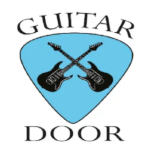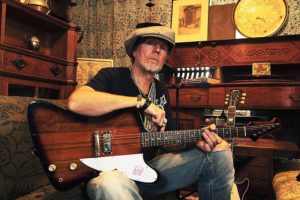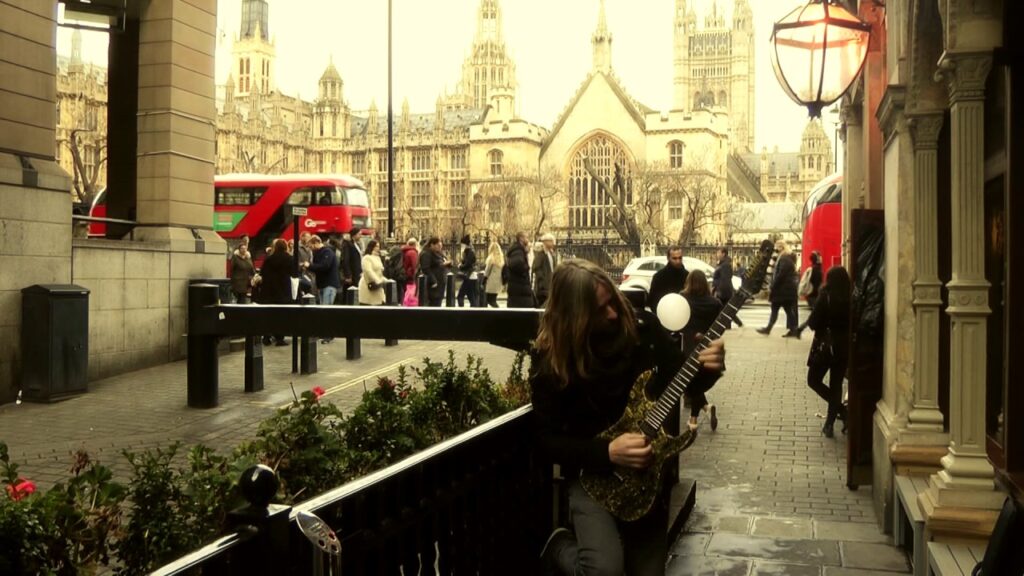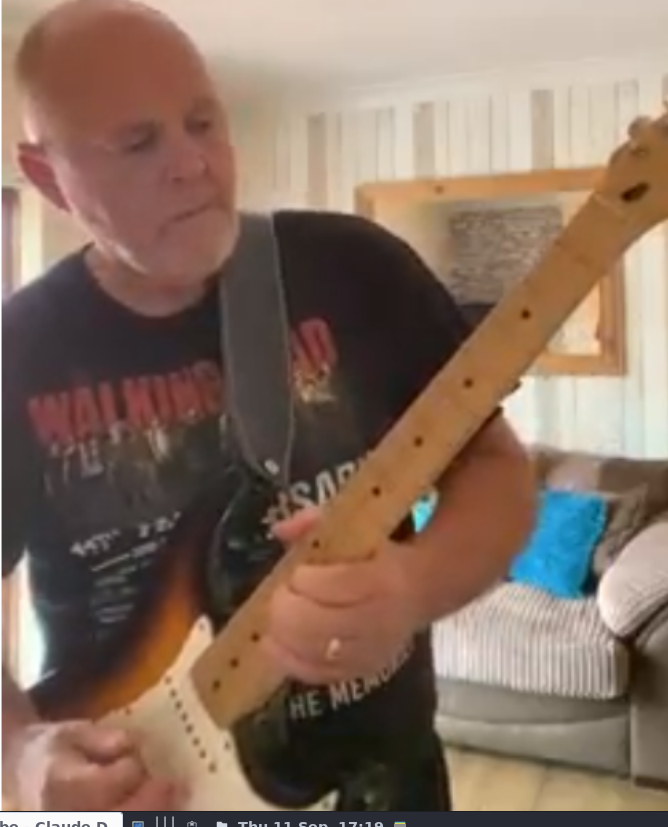The Guitar Guardian Michael Molenda is with us today for a Guitardoor Interview. He and I have been in each other’s orbit on and off since 2007. He was kind enough to include me in Guitar Player Magazine’s “Editor Boy’s Big Eight” feature for my song “Black Widow”. He has Graciously tolerated my ambitious pestering over these years.
Being the Longest running Editor for Guitar Player is by far not the be-all-end-all of his musical involvement. I have watched closely during this time of on and off communications small sections of his time as a player and now am pleased to learn myself and share with you his story in his own words.
What brought you to the Guitar? What was your first guitar, First performance?
“Like pretty much everyone in my age group, seeing the Beatles on The Ed Sullivan Show on February 9, 1964, was a seismic event. My dad hated them, of course, so I was 100 percent in. I wanted the boots, the trading cards, and the hair, and I circled the crap guitars in the Sears catalog with a pen hoping to get one for Christmas.
That didn’t happen—not really a surprise. But, incredibly, one of my 7,450-year-old Italian aunties sent me a copy of Songs, Pictures, and Stories of the Fabulous Beatles on Vee-Jay Records as a gift. Who knew? I hid the album at my grandma’s and played the crap out of it. Inspiration was brewing…”
“But it wasn’t until I saw The Who performing in some London town park on the Today Show when I was home sick from school that I really got the playing jones. The Beatles looked so beautiful and flash and ultra-cool that they were intimidating. But The Who was kinda like me and the kids at school, so I thought, “Hey, I can do this!”
“My mom took pity on me, bought a cheap acoustic at a local music shop, and enrolled me in lessons with an elderly Swedish woman. It wasn’t what I expected.
Playing “Mary Had a Little Lamb” on an acoustic guitar was a long-ass way from rocking out “Please Please Me” on an electric Rickenbacker. Furthermore, when I brought the teacher some Beatles sheet music, she took out a pen and corrected it! “This can’t be,” she said. “It’s not in the right key.”
“I told my mom I’d rather join the Cub Scouts. That was the end of Mike on Guitar Phase I.”
“When I got to high school, a kid named Kirk Griffin was fronting a ’50s-style band that played in the food court. He had a semi-hollow Fender Telecaster, and I was entranced once again.
I brought in my best friend Mark Davis as a co-conspirator. We bought super-cheap, off-brand electrics (mine was a black Les Paul knock-off with gold hardware) and Fender Champ amps and we tried to jam. Just awful. But I bought all of the rock-lesson books that I could, picked up Guitar Player magazine religiously, locked myself in the bathroom for hours, and practiced like a demon.
I also developed a thing for attempting to write songs and record them on a Radio Shack cassette recorder—thanks to Pete Townshend for giving me the composing/recording bug.”
“Finally, the aforementioned Kirk Griffin started another band to do contemporary rock covers, and he asked me to join. I told him I was crap, but he encouraged me to just do it.
A lot. It took days for me to get over my fear. But I did it, and my first gig was at a divey Mexican restaurant by day/bar by night. To make a stage, they put some wood planks across a couple of the booths. I was in heaven. I haven’t stopped playing since.”
Monkeys at the Flamingo Resort 2n Promo
So how did you become the Guitar Guardian you are Today and What is your background?
“I was born in San Francisco to a very close, but very conventional Italian family. My grandpa, dad, and uncle had suffered through the Depression and World War II—my uncle lost his leg in Monte Casino, Italy when a German Stuka dropped a bomb on his tent—so they were all very pro-America and conservative. They weren’t ready for the 1960s at all.”
“But I was lucky once again because I lived near Golden Gate Park, which was a stone’s throw from Haight-Ashbury. When the Summer of Love hit, I was practically in the middle of it—rainbow-clothed hippies, barefoot girls with flowing hair and no bras, smiles everywhere, and music blasting from clubs and street corners. Magical.”
“I was too young to hit all of the famous—and infamous—venues in the area, but I realized very early the power of the female. The older brother of a school friend of mine got stuck “babysitting” us one evening, and he decided, “Fuck it.
I want to see Lee Michaels at the Fillmore, so I’m going to drag these pipsqueaks along.” No one stopped us. And when the older brother got hip to the fact all these gorgeous hippie chicks were talking to him because they thought my friend and I were cute, we had a weekly “free ride” to the best concerts of the era.
I got to go to the Fillmore, the Avalon Ballroom, The Family Dog, Winterland, The Straight Theatre, the free park shows, and more, and I saw everyone from Jimi Hendrix to the Jefferson Airplane to the Doors and Satana and Moby Grape and the list goes on and on. How could I not fall in love with music after being exposed to that paradise of beautiful noises?”
EBOW THE ’60s! • “I’ll Make You Happy” • The EasybeaTs
How would you describe your personal musical style
“It’s pretty rudimentary, actually. I loved everything from Dean Martin to Deep Purple, but I gravitated to garage bands and punk bands, as well as anything that produced a “scene”—mod, glam, new wave, and so on. It’s all a blend of what I tend to define as non-super-technical creative explorations.
I’ve never really thought about a “personal musical style,” so since you’ve asked me, I guess I’d go for British Invasion melodicism with punk-rock dynamics and a dash of weirdo iconoclasts.”
Who are your primary influences?
“Well, the Beatles, obviously, and practically the entire British Invasion. If I was going to build altars in my garage, you’d see posters of Link Wray, Pete Townshend, Mick Ronson, Reeves Gabrels, Tom Morello, Bill Nelson, Marc Bolan, Jennifer Batten, Les Paul, Sister Rosetta Tharp, Jeff Beck, Paul Kossoff, Jan Akkerman, Robbie Krieger, Davie Allen, Dave Davies, and Andy Summers.”
“Whirlwind (Ode to Michael Hutchence)” by L’Ambretta
So as a Guitar Gaurdian What’s your go-to gear?
“It starts very British and then moves onward. My favourite amps are the Vox AC15, Vox AC30, an Orange Tiny Terror. Collings Guitars made me a gorgeous 290 in “Monkee Red,” and Reeves Gabrels had Reverend send me one of his Signature Dirtbikes in a blue-metallic finish. I also have a prized Eastwood Bill Nelson model, a really good-sounding Gretsch Rancher acoustic in that stunning
“Gretsch Orange,” and an expensive, red Gretsch Electromatic that I turned into a faux “1967 Monkees Model.” I have boxes of fuzz and wah pedals.
I really need to divest myself of stuff I hardly ever use, but, you know, it’s hard for me to give up any fuzz and wah pedals. I have two short-scale basses—a Reverend Dub King in an avocado finish and a Musicvox USB in blue and cream.
Recently I purchased a really kick-ass Gretsch Renown Classic 57 drum kit in black oyster pearl that reminds me of the Ludwig kit Ringo played on The Ed Sullivan Show.
It’s not even the same brand, but it makes me happy to sit behind it and pretend I’m watching John, Paul, and George rocking out in front of the stage. Silly.”
What are your fondest memories of people you have met or worked with?
“Wow. So many memories. I’ve been a music journalist for decades now, and I’ve met or interviewed 99.4 percent of my heroes. I have been so lucky. Interviewing Paul McCartney was a thrill. Duh.
He is everything you’d dream that he would be—super nice, informative, funny, and so easy to talk to. Thanks to guitarist Steve Lukather, I was able to meet Ringo, and there’s another legend who couldn’t be nicer.
There have been some not-so-awesome interactions, of course, but I’m going to keep those to myself. My dad always said, “If you can’t say anything nice about someone, don’t say anything at all.” Hahaha.
“But, beyond the celebrity moments, my fondest memories are probably creating content with all the magazine staffs I’ve worked with—Guitar Player, Guitar World, Guitar Connoisseur, Bass Player, Electronic Musician, Keyboard, Rumble, Modern Drummer, Mix, EQ, The Droning Company.
Naming all the editors and writers of these publications individually might break the Internet, but it is one hell of a magic trick to sit with creative people and build a magazine from absolutely nothing every month. It doesn’t exist at all until everyone sits down, tosses out ideas, devises strategies, and goes out and writes the thing. We make these lovely little magazines out of thin air.
I feel so grateful that I’ve been able to work with so many smart folks. I’ve learned so much from them, and I continue to learn stuff every day”
What do your future plans entail?
“COVID has made consistent gigging very difficult, and while a lot of people think the pandemic is over, the new strains coming down the road absolutely have the power to shut everything down again.
Even for the big acts, it’s almost impossible to get tour insurance at present, and how many bands could write a check for a canceled arena gig due to an outbreak of audience fears?
I’m nervous that the concert business can keep going, that bars can stay open, that clubs and other venues can be profitable in 2022. So there’s that.”
“But one of the lessons of the pandemic is that creative people need to find other ways to share their creations and to bring in revenue.
For me, that meant—and means—taking on virtual recording and mixdown sessions as a player and/or producer. Thank goodness for digital!”
“It meant becoming a co-founder of Neural Tunes (along with guitarist Matt Gibson, Christian Brady of Hell Yeah, serial entrepreneur Bryan Talebi, and
AI expert DeKai ai expert system)—a tech startup that seeks to deploy AI, biometrics, and music to alleviate anxiety and other brain-based challenges. I got big into licensing my back catalog of songs and writing and writing new songs.”

“I founded the content initiatives Guardians of Guitar and NowGen Drums, and I started my own marketing/media company, Content By Molenda.”
“My good friend Ted Mason of Mi5 Recordings/Universal Music Group did me the massive favor of providing me with a digital-music imprint through his record label.
Another good buddy, guitarist Stuart Smith—who played with The Sweet and Heaven and Earth—brought me on board to be an editor of his drone website, The Droning Company. Modern Drummer hired me as Content Director.”
“Thanks to guitarist Steve Walton and bassist Desmonde Mulcahy, the surf trio that I actually play drums in—Surf Monster—signed a deal with Sharawaji Records.
I also play bass in Bad Jacket with guitarist Jon Plutte. and drummer Jon Christ. Someday, I will bring back my beloved The Trouble With Monkeys, which performs hard-rock/punk versions of Monkees hits.
I play guitar and sing in that act along with my wife Cheryl, so it’s a fabulous project, but it had to go on hiatus due to COVID.”
“Finally, I am still out there playing shows, as carefully as I can. I am so grateful that I’ve never been busier, and I’ve met so many awesome creators and new friends during COVID.
Who would have thought this could happen to me back in the early days of the virus and the lockdowns? But I stayed optimistic, I kept playing, and I opened myself up to opportunities. I also took the William Shatner Approach to Life: Say “Yes” to Everything.”
L’Ambretta Collaboration with Drummer Dana Parker
What wisdom or advice do you have for a young person deciding to pick up the instrument today?
“You have to really love guitar to the point of an unhealthy obsession, because the industry is a shambles, and it doesn’t always reward hard work and transcendent playing.
I’m not trying to sound like a post-modern hippie—although I guess that’s a fair assessment of a big chunk of my personality—the love of the Guitar and music is what will save you and sustain you.”
“I’ve never been disappointed in making music and playing guitar. I play every single day—it’s like I have no choice in the matter.
Everything else about music—the actual business of being a musician, band members, bands, consumer culture, revenue shares and acquisition, social-media hoohaa, managers, bookers, record labels, and the like—would have crushed me into dust if I didn’t adore the act of holding a guitar in my hands and trying to write a song with it.”
Michael has taught me many things over the years, planted seeds that took an older me to appreciate. From many aspects of music journalism to what works and what doesn’t in the corporate world.
He has, if you take the time to really think about it, played a major hand in bringing most guitarists an education for a very long time.

His talents are many, his convictions are steadfast and his views are never boring. We in the Guitar community owe him a thank you. This interview is mine, albeit a small tip of the hat to the man.
I have respected him for more years than I’ve been in contact with him. These many years we have been in touch, We may not have always agreed on certain things but I consider him my friend as friendships endure different things.
Thank you Mike for this interview and to the reader, I’ve always liked him but he scores extra points as He and I both love Vox amps and Link Wray. That is all I need to know to Dig him that much more!
Michael Molenda
• Founder/CEO, Guardians of Guitar, NowGenDrums
• Content Director, Modern Drummer Magazine
• Head Buckaroo, Content By Molenda
• Vice President, Guitar, Mi5 Recordings/Universal Music Group
• COO, Neural-Tunes (“Music as Medicine to Alleviate PTSD”)
• Longest Serving Editor in Chief of Guitar Player (1997-2018)



